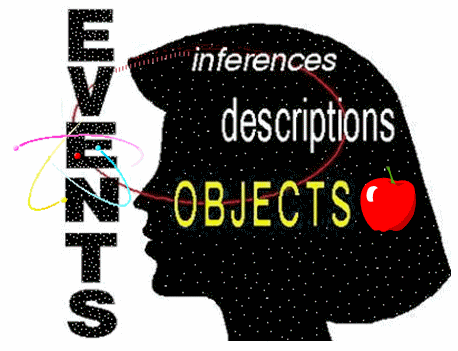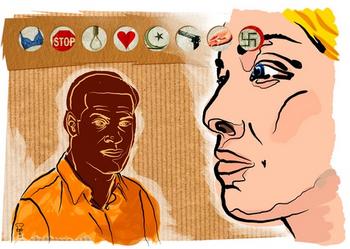
General Semantics of Racism
Written 1996, revised 2011, by Steven LewisI teach at an inner city college that employs and enrolls lots of diversity. I have noticed at gatherings that participants tend to gravitate more toward the familiar (fellow employees or students, for example), even if they be of different skin colors, while hesitating to approach strangers, even though they be of similar skin color. These observations support a situational (extensional) definition of "sameness" that is based more on familiarity than 'race' and sex. If I entered an elevator to find a black colleague and an unknown white male, I would almost certainly gravitate toward my black colleague because of the interests we share.

Regarding "prejudices," the word literally is formed from "pre-judge." In a sense we are all prejudiced, and often for good reason. If I try to pick up my kitty and he bites me, then, once bitten, twice shy. I will be hesitant about trying to elevate kitty again. Of course, the next time is a different situation. Nevertheless, the only value to memory is that it allows us to profit from our experiences so that we can make better decisions in the future. Kitty may not bite me next time, but I would be a fool to find out the hard way and risk losing another hunk of flesh.
The problem of "prejudice" for me, as a practitioner of gs, is to form my 'prejudices' using extensional standards of evaluation. That includes learning to differentiate descriptions from inferences, particular situations from generalities, and to be alert to the details of a situation that signify I should change my evaluation. And if my kitty shows signs he wants to cuddle tomorrow, I want to be able to take advantage of the opportunity.
Racism, as I use the term, involves the evaluation of an individual on the basis of irrelevant and, often, erroneous standards. It may be the result of over-generalized personal experiences (maybe we were once robbed by a person of Chinese ancestory so we become suspicious of all Chinese) or intensional fairy tales handed to us by our elders ("blacks are lazy") ....
In gs we would say that racism is an example of over-evaluation by intension (generalization) and under-evaluation by the details of a situation ("the extensional facts"). Those who would want to abolish racism would be best advised to approach the problem from a broader perspective of intensional versus extensional evaluation. Otherwise we end up promulgating laws that produce reverse discrimination, and the associated hard feelings generated in its victims.
Go to General Semantics Home Page ||| Go to Steven Lewis Home Page